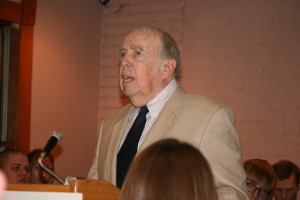Magna Carta Remembered, Finally
A venerable enumeration of the rights of man is barely taught anymore, resulting in record low recognition of same.
“I went to see the Magna Carta when it was on display a few years ago,” British Conservative MEP (Member of the European Parliament) Daniel Hannan remembered in a speech in Grand Rapids, Michigan last week. “You can get right up to it: Nobody comes.”
“When it was on display in New York City in 1939, 14 million people came to see it.” Hannan was the keynote dinner speaker at the Philadelphia Society’s regional meeting on Friday, October 10th. The Society of leading conservative intellectuals was formed in 1964 in the wake of the Goldwater defeat.

“I took my mother to Runnymede Fields to see where the Magna Carta was signed,” author M. Stanton Evans recalled when promoting his book, The Theme is Freedom: The Religious Roots of American Liberty, in 1995. “On the ride over, the cab driver said, ‘and this is the home of Elton John.’ My mother said, ‘who is Elton John?’ Later when I told that story to a group of recent college graduates, they said, ‘what is the Magna Carta?’”
After my Zimbabwean-born and raised wife heard that story, she said, “I can’t believe your schools don’t teach the Magna Carta. We learn about the Magna Carta.”
Granted by King John in 1215, “Magna Carta is a lengthy catalogue of safeguards against the abuse of power, guarantees of religious liberties, legal rights, taxation by consent, and so on,” Evans wrote in The Theme is Freedom.
“Abuses by King John caused a revolt by nobles who compelled him to execute this recognition of rights for both noblemen and ordinary Englishmen,” the Constitution Society notes.” It established the principle that no one, including the king or a lawmaker, is above the law.”
Hmm, maybe that’s why they don’t want to teach it.
“The democratic aspiration is no mere recent phase in human history,” President Franklin D. Roosevelt said in his 1941 Inaugural address. “It was written in the Magna Carta.”
“No freeman shall be taken, imprisoned, disseised, outlawed, banished, or in any way destroyed, nor will We proceed against or prosecute him, except by the lawful judgment of his peers or by the law of the land, “ the Magna Carta reads. “To no one will We sell, to no one will We deny or delay, right or justice.” The free dictionary defines disseised as “to deprive (a person) of the possession of land, esp. wrongfully or by force.”





